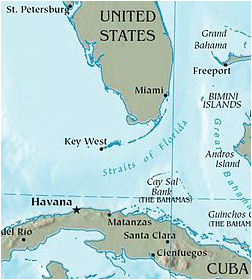 Florida to Cuba is the farthest 90 miles you'll ever (not) travel. Florida to Cuba is the farthest 90 miles you'll ever (not) travel. There’s an irresistible appeal to the unknown, off limits and seldom seen. A child who dares to explore a dangerous, discouraged place is disobedient. A teenager is considered rebellious. So as an adult, I became a journalist. The same behavior can be rebranded as “professional curiosity.” That desire to see the rarely seen can take you far. It almost got me to Cuba. Until the government stopped me. In 2011 I stood inside Tampa International Airport. Bags packed. Camera in hand. I held a ticket to Havana, dreaming of the time-capsuled Cuban streets and stunning architecture waiting on the other side of the short but very exclusive flight. Travel restrictions had been eased slightly, allowing visas to Cuba for relatives, humanitarians, journalists and a handful of others. The line at the ticket counter was mostly Cuban-Americans holding as many U.S.-bought products as they could bundle for luggage. They were delivering to their family members who had long-lived within Castro’s isolated limits. I stood with French Horns and cellos. The Saint Petersburg Orchestra, a group on the forefront of this new era in travel between the United States and Cuba, had arranged a cultural exchange. American musicians would teach, perform and learn from their Cuban counterparts. It would be the first endeavor of its kind, and I fought to cover it. It was a process, just getting to the airport. I pitched the story months before the flight. Corporate bosses looked in to safety concerns, waivers were signed, backgrounds were checked and forms were filed with the U.S. State Department. The only snag… my visa hadn’t come in, and my flight was in two hours. “Not to worry. It’s the Cuban way,” I was told by our liaison between the two governments. He expected a last minute call to the airport from Cuba, granting access in to their country. I had a sinking feeling, what if this falls through? The airfare is purchased. Work schedules were altered. U.S. Customs pre-logged my equipment. It was a big deal. “Not to worry,” he said. Things looked up when two other journalists received their long-awaited call approving their entry. One anchored an independent TV news outlet. The other wrote for the local newspaper. My visa, as a reporter for a network-owned TV station, and the visa for a journalist from Telemundo did not arrive. The flight boarded. Took off. And I was not allowed on it. “Not to worry,” our liaison said. “There’s another flight from Miami. You’ll drive there and wait on my call. I will get your paperwork once I arrive in Cuba. It may require some palm greasing. This is the Cuban way. You’ll get in.” I didn’t drive to Miami on the hope of a bribe saving my story. Instead I trusted my instinct that something else was going on behind Castro’s Cuban curtain. Sure enough, when my liaison arrived in Havana his news was not as triumphant. He said the Cuban government denied my journalist visa because of my station's network affiliation. I worked for a FOX affiliate at the time, and the Cuban government felt the cable network's coverage of the country had been unflattering. The Telemundo reporter was denied for the very same reason. Now remember, I was going to cover a symphony! My local station had turned many stories on the excitement felt by the local Cuban community about their new found ability to visit their families. This cultural exchange would have been yet another positive news story if only the access of a local, unbiased television affiliate hadn't been blocked due to the Cuban perception of Fox News Channel. But the Cuban government controls who enters. And by doing that they – to an extent – it controls the message that gets out. Ultimately I was offered one chance to get in, on a tourist visa. “Not to worry, you’ll get in as a tourist and can file your reports anyway,” my liaison said. That was my last communication with him. Although tempting, that was a line I was not willing to cross. A line that quite likely would have ended with me in a Cuban jail for false representation (or basically any charge they wanted to write up). A Cuban jail is certainly is an “unknown, off limits, seldom seen” locale… but one even I didn’t want to experience for “professional curiosity.” With the announcement of a “new chapter” coming to Cuban-American relations in 2014, I am hoping one day to have another chance to see those Havana streets.
0 Comments
|
ME:Jeremy Campbell is an ATLien, storyteller, traveler... & often all three at once. HISTORY:
December 2016
Categories: |
 RSS Feed
RSS Feed